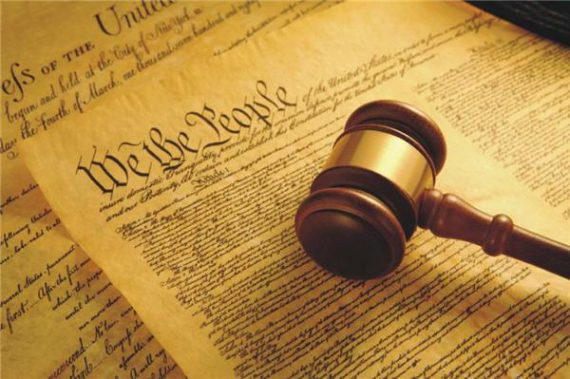Federal Appeals Court Rules DOMA Section 3 Unconstitutional
An unsurprising decision on the Defense of Marriage.
The First Circuit Court of Appeals ruled unanimously, in a panel that included two Republican appointees, that Section Three of the Defense of Marriage Act,which bars same-sex couples from being recognize as married under Federal Law, is unconstitutional:
BOSTON (AP) — A federal appeals court Thursday declared that the Defense of Marriage Act unconstitutionally denies federal benefits to married gay couples, a groundbreaking ruling all but certain to wind up before the U.S. Supreme Court.
In its unanimous decision, the three-judge panel of the 1st U.S. Circuit Court of Appeals in Boston said the 1996 law that defines marriage as a union between a man and a woman deprives gay couples of the rights and privileges granted to heterosexual couples.
The court didn’t rule on the law’s more politically combustible provision, which said states without same-sex marriage cannot be forced to recognize gay unions performed in states where it’s legal. It also wasn’t asked to address whether gay couples have a constitutional right to marry.
(…)
The 1st Circuit said its ruling wouldn’t be enforced until the U.S. Supreme Court decides the case, meaning that same-sex married couples will not be eligible to receive the economic benefits denied by DOMA until the high court rules.
That’s because the ruling only applies to states within the circuit — Massachusetts, Rhode Island, Maine and New Hampshire — and Puerto Rico. Only the Supreme Court has the final say in deciding whether a law passed by Congress is unconstitutional.
Although most Americans live in states where the law still is that marriage can only be the union of a man and a woman, the power to define marriage had always been left to the individual states before Congress passed DOMA, the appeals court said in its ruling.
“One virtue of federalism is that it permits this diversity of governance based on local choice, but this applies as well to the states that have chosen to legalize same-sex marriage,” Judge Michael Boudin wrote for the court. “Under current Supreme Court authority, Congress’ denial of federal benefits to same-sex couples lawfully married in Massachusetts has not been adequately supported by any permissible federal interest.”
During arguments before the court last month, a lawyer for gay married couples said the law amounts to “across-the-board disrespect.” The couples argued that the power to define and regulate marriage had been left to the states for more than 200 years before Congress passed DOMA.
Paul Clement, a Washington, D.C., attorney who defended the law on behalf of the Bipartisan Legal Advisory Group, argued that Congress had a rational basis for passing it in 1996, when opponents worried that states would be forced to recognize gay marriages performed elsewhere. The group said Congress wanted to preserve a traditional and uniform definition of marriage and has the power to define terms used to federal statutes to distribute federal benefits.
Clement did not immediately return a message left Thursday. The legal group could ask for the case to be reheard by the full 1st Circuit, which typically sits six judges, or could ask the U.S. Supreme Court to take on the case.
Lyle Denniston at SCOTUSBlog comments:
The ruling nullified Section 3 of the Defense of Marriage Act, passed by Congress in 1996 to deny any federal benefit to a same-sex couple, even if the spouses were legally married under state law. This is one of the gay marriages cases now developing around the Nation that may soon lead to one or more appeals to the Supreme Court, very likely in the Term opening October 1. “Only the Supreme Court can finally decide this unique case,” the First Circuit commented.
If the new ruling withstands a likely appeal, it would actually affect only gay couples in the six states and the District of Columbia that now allow such marriages, but it could serve as a constitutional precedent for challenging other limits or bans on gay marriage in any state.
Thursday’s ruling by the First Circuit marked the first time that a challenge to DOMA had succeeded in a federal appeals court, but the same issue is now pending in the Ninth Circuit Court after two federal judges in California had found Section 3 to be invalid. The Ninth Circuit Court is also pondering now a request that it reconsider, en banc, a three-judge Circuit panel’s ruling in February striking down California’s voter-approved “Proposition 8,” banning same-sex marriage in that state.
DOMA’s Section 3, limiting any federal benefit based on marriage to a man and a woman, applies to more than 1,000 federal laws and is understood to affect more than 100,000 married gay couples around the country. While Congress did not seek in DOMA to directly outlaw same-sex marriage, it did deny access for such married couples to such things as Social Security survivor benefits, health insurance for federal workers’ spouses, and other medical benefits, and it barred such couples from filing joint federal tax returns.
The First Circuit also noted that the ban “has potentially serious adverse consequences for states that choose to legalize same-sex marriage.” In fact, the state of Massachusetts joined in this challenge by arguing that Section 3 would revoke federal funding for the state’s Medicaid program for the poor, and for state veterans’ cemeteries.
It’s worth noting what the Court hasn’t ruled here. The Court did not rule that there is a Constitutional right to same-sex marriage, nor will its ruling have any impact on Section Two of the Defense Of Marriage Act, which permits states to refuse to recognize validly performed same-sex marriages from other states notwithstanding the provisions of the Full Faith And Credit Act. Instead, the Court ruled that the limitations in Section Three that defined marriage for Federal purposes as only between one man and one woman violated the 5th Amendment Equal Protection rights of same-sex couples who have been validly married under the laws of their home states. This definition impacts everything from Social Security, Medicare, and Medicaid, to pension benefits for Federal employees and benefits for military spouses. Essentially, the Court ruled that there was not sufficient justification for treating same-sex spouses differently under Federal law. In doing so, though, they did it in the most limited way possible:
[T]he language of the 1st Circuit’s 35-page ruling is no Jeremiad against DOMA or opponents of same-sex marriage. It is not something likely to be as widely quoted as other recent rulings over same-sex marriage in America. And it clearly does not purport to be the definitive or last word on the subject. We have here instead a modest ruling which accomplishes four significant things at the same time (something, not incidentally, that intermediate appellate courts are supposed to do as they funnel cases up the ladder to Washington).
The ruling: 1) narrows the scope of the trial judge’s decision which preceded it; 2) offers the Supreme Court several avenues of precedential escape should the justices subsequently wish to use them; 3) takes a broader view of federalism as it relates to this law and its impact upon state marriage laws, and; 4) is notably diplomatic in its brief assessment of the “work” Congress did in passing the statute.
As the linked article goes on to note, the Court’s decision provides a number of “outs” for a future Supreme Court to decide the case differently and still stay within current precedent. So, yea, it’s a victory for the marriage equality movement but the legal ground on which this ruling stands appears to be much shakier thank I’m sure the opponents of the bill would prefer under the circumstances. Of course, there’s still the 9th Circuit case and the possibility that the Court’s ruling there will be far more broad based, but that’s a matter for another day at this point.
As I’ve argued before, I don’t think there’s any question that Section 3 of DOMA is unconstitutional. Not only is there nothing in the Constitution that gives Congress the power to define what “marriage” is, once you had states beginning to recognize same-sex marriage rights and allow gay couples to get married, it was rather apparent that this provision was violating the rights of these married couples to be treated equally. We’re not dealing with Section Two here at all, although I think if the Courts did there would be a fairly good argument that it too is unconstitutional, so nothing that the First Circuit decides today will force any other state to recognize gay marriage, either on its own or through the acts of a sister state. All the Court said today is that the Federal Government must treat equally situated people equally, and I cannot honestly see how anyone can disagree with that.
Here’s the Court’s opinion:







Just for the sake of argument…so what? There’s arguably nothing in the Constitution denying Congress that power, either. And since Congress has passed bills, subsequently signed into law, giving married couples benefits or otherwise distinguishing them from others, why can’t they also define what constitutes “marriage” for the purpose of determining who receives those benefits from the federal government?
@Boyd:
The entire idea of Article I, Section 8 is that unless the power is given to Congress in the Constitution, the Congress does not have that power. That said, you do make a valid point in your last sentence. However, even that power to define “marriage” for the purposes of benefits, etc would have to comply with other provisions of the Constitution such as the Equal Protection Clause
@Doug Mataconis: Because…Commerce Clause!
It reaches the right decision on the narrowest possible grounds, while stylistically conveying reluctance. No reasonabel person can accuse this circuit panel of untrammeled judicial activism.
Is there a conflict between the circuits? TFA has 3 circuits holding it unconstitutional, 0 the other way. In the conservative era pre-Roberts this probably wouldn’t reach the Supreme Ct.
So are the fiscally responsible Republicans in the House going to spend a bunch more money taking this to the Supreme Court?
It is worth pointing out that this provision has always been surplusage because states have never been compelled to recognize marriages from other states would not be legally under the first state’s laws. Thus, Jerry Lee Lewis’ marriage to a 13 year old is not recognized in NY, or a cousin-marriage allowed in early Rhode Island history was considered criminal incest in Massachusetts.
I guess it made sense to codify this point when DOMA was enacted, but this has been a long-time exception to the full faith and credit clause, and if DOMA were repealed by Congress it would still apply.
Good blog post.
FWIW, I always opposed DOMA, for the precise reason that the Feds shouldn’t be defining what marriage is or isn’t. To my way of thinking that’s the epitome of a state law issue. If I had been in Clinton’s shoes I would have on that basis alone vetoed DOMA. At this point, with various states having legalized same-sex marriages, I agree 100% that Section 3 is unconstitutional as being violative of the equal protection clause.
There still remains what IMO is the elephant in the room: Should the full faith and credit clause require State A to recognize a same-sex marriage performed in State B if State A either by legislation or plebiscite has defined marriage otherwise? I would say no, that State A’s marriage laws should not be abrogated based upon what a sister state has done. Ergo I would not be opposed to Section 2 as a stand-alone federal bill, in that interrelations between and among the several states concerning conflicts of laws to my way of thinking is a proper subject for Congress.
I don’t believe there is a federal Constitutional “right” to marry, whether same-sex or hetero. I don’t believe a state defining marriage to exclude same-sex couples violates equal protection, in that a state sovereign does have a compelling interest in population growth and thus procreation.
In any event, obviously in the final analysis the SCOTUS will end up determining all of this for us, or at least determining it de facto if not de jure. In that regard I have a sneaking suspicion that the laws of unintended consequences will rear their heads.
@Tsar Nicholas: I’ve always been leery of using procreation as a justification for sanctioning heterosexual marriage while banning homosexual marriage. By that logic, I shouldn’t have been allowed to marry my wife since there’s no way (physically or attitudinally) that we were going to have more than the seven kids we already had between us. And that’s without even stooping to the “Britney!” argument.
The bans on same sex marriage fail to stand up against consitutional scruitiny on several points.
Article IV Sections 1 and 2
1st Amendment
9th Amendment
14th Amendment
@Tsar Nicholas: The US Supreme court has on several occasions stated that there is a basic right of persons to marriage.
Here are 3 such cases…
Loving v Virginia (1967). Mildred Jeter, a black woman, and Richard Loving, a white man, had been found guilty of violating Virginia’s ban on interracial marriages and ordered to leave the state. The Court found Virginia’s law to violate the Equal Protection Clause because it invidiously classified on the basis of race, but it also indicated the law would violate the Due Process Clause as an undue interference with ‘the fundamental freedom” of marriage.
In Zablocki v Redhail (1978), the Court struck down a Wisconsin law that required persons under obligations to pay support for the children of previous relationships to obtain permission of a court to marry. The statute required such individuals to prove that they were in compliance with support orders and that marriage would not threaten the financial security of their previous offspring. The Court reasoned that marriage was “a fundamental right” triggering “rigorous scutiny” of Wisconsin’s justifications under the Equal Protection Clause.
In Turner v Safley (1987), the Court refused to apply strict scutiny to a Missouri prison regulation prohibiting inmates from marrying, absent a compelling reason. Instead, the Court found the regulation failed to meet even a lowered standard of “reasonableness” that it said it would apply in evaluating the constitutionality of prison regulations.
@Boyd:
The Tenth Ammendment?
@Stormy Dragon: I refer you to my previous comment:
Seriously, though, I can’t imagine how Congress can’t define terms when it comes to providing federal benefits. Note, I’m not advocating a position here, I’m merely probing the limits of logic (in a practical sense, not an absolute sense).
It is ridiculous to me that a gay marriage that is recognized as legal in say, Vermont, would not be recognized as legal in say, North Carolina. State’s Rights has its limitations when you’re talking about fundamental civil rights and equal protection under the 14th Amendment.
@al-Ameda: Again, just for the sake of discussing the issue fully… If it’s about fundamental civil rights, then which state says what shouldn’t matter. If it’s based on equal protection, why does Vermont get to dictate the terms of marriage to North Carolina, and not the other way around?
@Boyd:
If you accept a State’s Right approach then you’re right, each state is free to discriminate as they prefer. As a practical matter, in my example, a married gay couple would potentially suffer economic penalties if a job promotion necessitated a move from Vermont to North Carolina (where they also prohibited gay civil unions.)
Allowing States to discriminate seems to me to be incompatible with Constitutional equal protection .
@al-Ameda:
It may be ridiculous to you, but it is also the way states have handled the differing policies of the different states regarding marriage laws. It is an interesting aspect of federalism, that states are not required to accept on another’s marriages, but the federal government is required to accept them. Where there is a clear basis for the federal government to look behind the marriage license to evaluate the legitimacy of the marriage (immigration cases) then the federal power is sufficient to do this.
Anyone who has made it as far as the first class in family law at law school should understand this. I am amazed at the number of lawyers out there who have never bothered to educate themselves about this issue.
@Xenos:
Thank you Xenos, I am not a lawyer, nor have I played one on television.